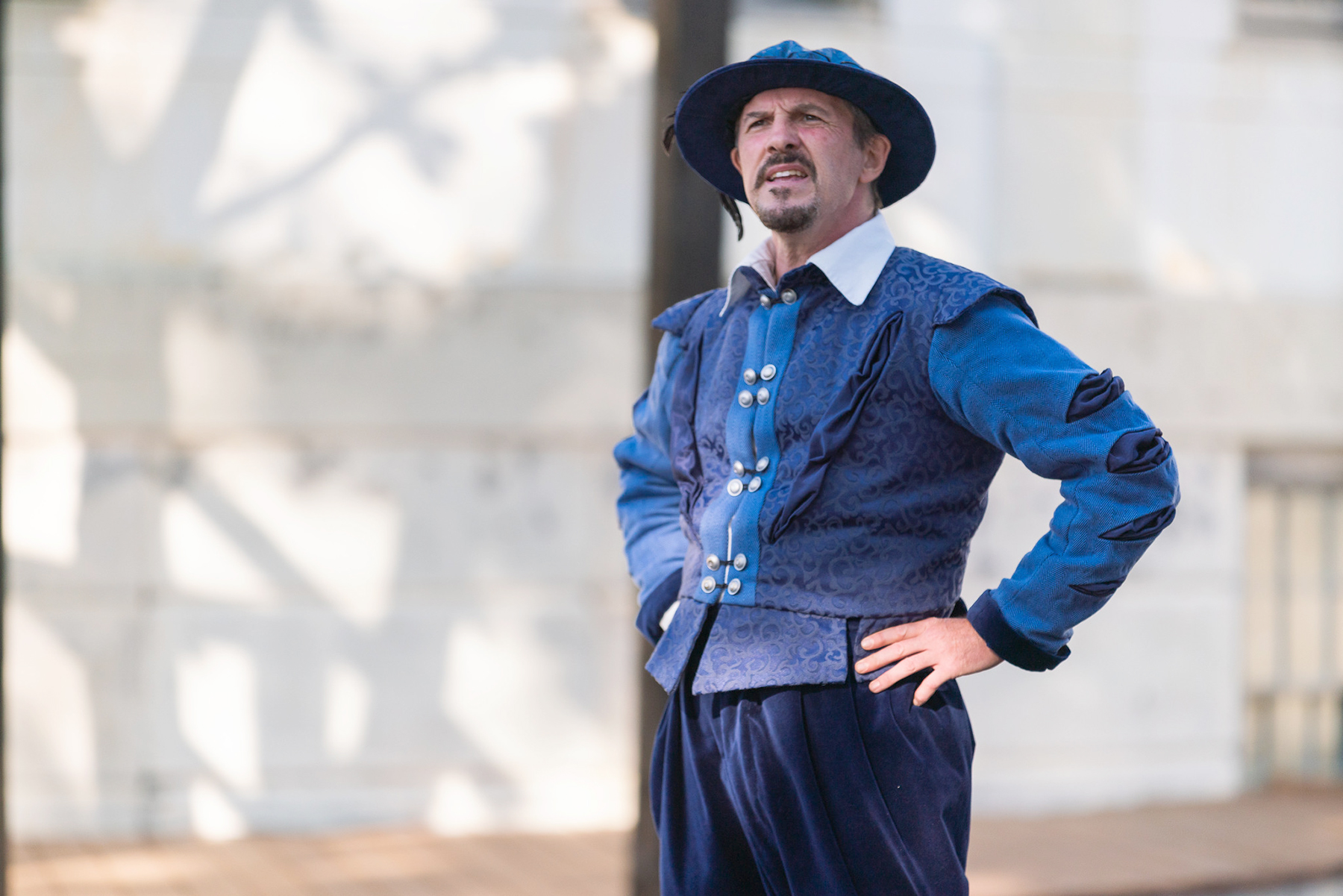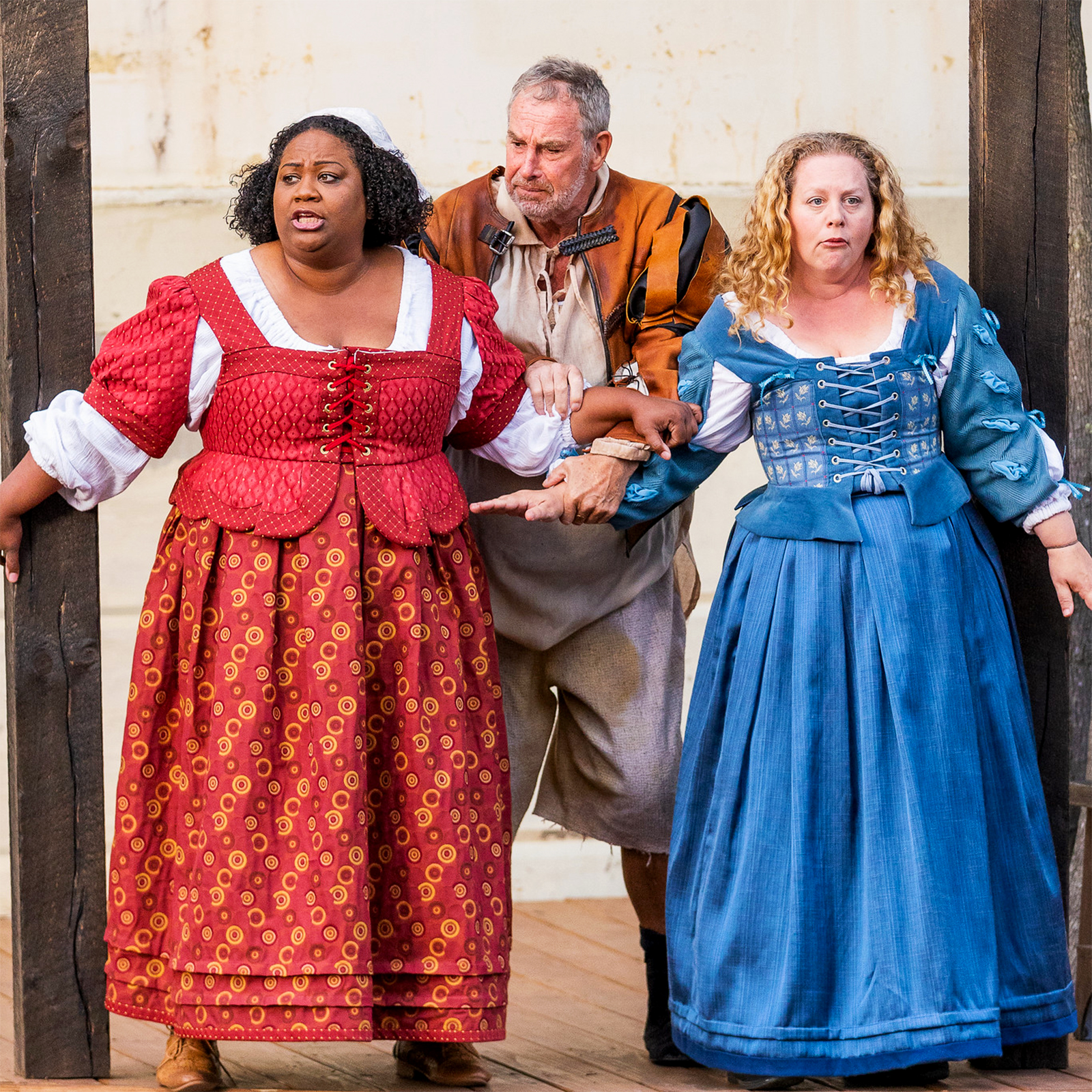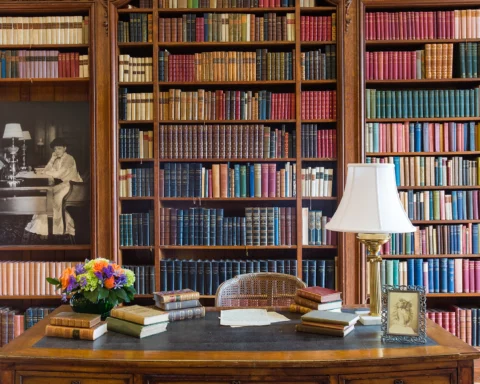Stirred up by just the right cast, the production is a winning recipe of conspiracy, chaos, and comedy.
No youth with a shred of decency or self-respect should seek to emulate Sir John Falstaff. On the other hand, if you happen already to be plump and middle-aged, yet randy as ever despite increasingly rusty charms, you could be forgiven for taking some winking inspiration from the dissolute knight’s bacchanalian habits. Cantankerous and crafty, Falstaff, dubbed “Shakespeare’s greatest creation” by Orson Welles, is the rotund and besotted hub of The Merry Wives of Windsor, on stage now through September 1 in the Roman Garden Theatre at Shakespeare & Company in Lenox.
Critics going back…like, centuries have slighted The Merry Wives as one of Billy’s weaker entries. I say bullshit. It’s one of his low-carb, breezier, made for TV works, for sure, but in the right hands, it’s a driving, delightful comedy that hits all the right marks. And director Kevin G. Coleman has exactly the right pair of hands for the job. The cast is composed of a mix of longtime company members, some building on a run of a few season, and a few brand new faces that include teen actors who’ve participated in Shake & Co.’s Young Company and the Fall Festival of Shakespeare, both programs of the education department that Coleman runs and that has been in operation since the company’s inception in 1978. The combination of seasoned veterans and newer faces teases out the potential for some really visceral comedic tension.
The play was written in, maybe 1597 or something, so it’s not like you have any right to be protected from spoilers, but I suppose if you haven’t seen it (it’s not staged as often as it should be), well, then, it’s still new to you. I’ll just give you the basics and let you guess as to whether it all comes out alright in the end:
Cowardly, drunken knight and soldier, Sir John Falstaff (whom you may recall from Henry IV, Part 1 and Part 2), lumbers into town in a down-and-out-in-Windsor frame of mind with a few servants/thugs in tow. He hatches a plan to get his lascivious game on in pursuit of any stray coin he can liberate from two wealthy, but married, women — Mistress Ford and Mistress Page. He decides to send both identical letters professing a potent, if groundless, love. While the women are each clearly well-aware of Falstaff’s ways, his sack-soggy brain seems to have overlooked the possibility that Mistresses Ford and Page would be BFFs, which, of course, they are.
[Hilarity ensues]
Add to this developing clusterfumble one jealous husband, one emotionally unavailable husband, an ill-advised matchmaking scheme that weaves in and out of Falstaff’s repeated attempts to woo the more-than-suspecting matriarchs, assumed identities, and lots and lots of signature Shakespearean snark, and you have the makings of an invigorating [madcap] romp.
There’s a lot to love about The Merry Wives. First of all, the production is outdoors, yes, but in a very intimate space that gives the cast full license to do what Shakespeare & Company does so well — work the crowd. Martin Jason Asprey, as the Jealous Husband of Windsor, Mr. Frank Ford, in particular, is in absolutely prime form as the pain of repeated cuckoldry overflows his tortured heart and spills out into the audience. The dynamic between Asprey and Nigel Gore, as Falstaff, is sublime. The two actors have enjoyed a long relationship and have worked together on plenty of occasions over the years, and still manage to infuse their scenes together with fresh reactions without the disappointing hint of familiarity that would break the spell. When Ford, in the guise of yet another conspiring interloper, sends the knight on a paid errand to seduce his own wife, their machinations are rich with barely contained fury on the part of Ford and building frustration on the part of Falstaff.
The two gents really are two sides of the same coin of middle-aged masculinity, really. Ford in his jealousy fairly reeks of self-doubt, insecurity, and fear that he’s lost the fire that could keep his wife from falling for the wiles of a wretch the cat dragged in. Although the scenes are laugh-out-loud funny, the comedic pacing also allows Asprey to paint a clear-coat of desperation over his antics. For his part, Falstaff, obese and offensive, believes not only that he still possesses a healthy does of his old virility and sexual guile, but that he could find two woman who’d actually pay for it. That sort of Peter Pan syndrome may not become a man of otherwise respectable traits and habits, but for Falstaff, a hard-living, hard-fighting, fast-lovin’ self-image is all that he possesses. For Sir John to turn loose of delusions of youth would unleash an identity crisis Shakespeare, no doubt, never wanted to be responsible for.

You can skip the philosophizin’ if you like, of course. It’s beyond delicious to watch Asprey and Gore pack every inch of their larger than life characters with their well-known prowess and respective, hallmark flairs. And for anyone wondering, both performances easily scale to fill the outdoor space, as far as audability is concerned — Gore’s understated delivery of Falstaff’s moody affectations deliver with Hi-Fi rapscallioninity. Asprey’s over-the-top lamentations and physical humor never overwhelm the scene. The back wall of St. Martins Hall forms the backdrop of the production, which reflects sound admirably, and allows for conversations to occur with backs to the audience and still be heard clearly.
Mistress Ford, played by Jennie M. Jadow, and Mistress Page, played by MaConnia Chesser, naturally have a different dynamic, in which both are the fuel and fuses of each others revengeancing. Alice Ford and Meg Page may be mere mortals, but baked into the dialogue is an impish sense of jest that would be worthy of the faeries of Windsor Forest, and Chesser and Jadow work the designs of the two wives as if they’d drafted Falstaff’s demise themselves. The chemistry between two drives the comedic chain reaction as their characters remain devilish catalysts in the midst of romantic chaos.
Shakespeare & Company has long explored the meaning of its place as a distinctly American festival, and many of the fruits of that introspection are on display in The Merry Wives. The cast is diverse, and rather than homogenize the production, director Coleman has seemingly encouraged a range of very American flavors of sass and swagger. The different flavors go together well, and create an environment where exceptionally Yank interpretations aren’t just acceptable, but authentically Bard in refreshingly re-imagined ways.
The Merry Wives of Windsor
By William Shakespeare
Directed by Kevin G. Coleman
August 08 – September 01, 2019
The Roman Garden Theatre
Shakespeare & Company
70 Kemble Street, Lenox, Mass.
WEBSITE
I cannot address each exquisite thing coming from the players, though a few notes are due — Cloteal L. Horne is way more than a hoot as Mistress Quickly, and Gregory Boover embodies a most charming suitor (or suitors) to Anne Page, played by Jordan Cobb (also the scheming innkeeper with attitude). Glenn Barrett as the ridiculous French Dr. Caius is the perfect counterweight to the pliably pious parson Sir Hugh Evans, played by Madeline Rose Maggio. (The diametric opposition between the two characters is one of many examples of Shakespeare’s prescience about the coming of the Age of Enlightenment, still more than a century hence). A heavy burden fell to Steven Barkhimer, as the bride-to-be’s (once a groom arose out of the lunacy) father, who carried off sane, stable, reliable adult-in-the-room mojo with ease, projecting an aplomb lacking in every other gentleman of Windsor.
The youth members of the cast are an especially energizing addition in their multiple roles, and created a much appreciated layer of personality and intensity within the setting. While teens can be forgiven for having yet to develop a set of pipes possessed by the likes of Asprey, Chesser, or Gore, more enunciation would go a long way towards understandability.
Somewhere in the middle of Act 4, the performance started gathering steam. I mean, you know this train is going to be rocking on the rails as it barrels towards the conclusion, but the rate of acceleration should vary a bit more. Dialogue-heavy explainer scenes would serve the production better at a slightly more moderated pace.
What comes across well throughout the performance is the combination of themes Shakespeare revisits throughout his body of work — class and country, loyalty and trust, gender, faith, the inner workings of the mind, and, of course, lust. The text explores all but the last item with a light-hearted snub here or a cautious poke in the eye there, but when it comes to sex, Billy gives full license to licentiousness. And that may be enough of a distraction from politically sensitive topics that he gets away with some of his thinly veiled commentary. In 2019, the topic of sex in the context of old men in aristocrat-level positions of power sure ain’t a distraction, and forget about punchline. The contradictions within America’s Puritanical views on sex (which get baked into the worldview of anyone who grew up here) make some of Falstaff’s utterances and actions a little jarring, but one wonders if the public’s collective mental health would be improved by more open conversations about carnal knowledge, replete with Nigel Gore’s explicit, thrusting charades, now and again.
Which brings us back to the question of where The Merry Wives of Windsor would fall on an Elizabethan Tomatometer. Scholars have suggested that the script bears the signs of a hastily written work. So what? He probably had creditors breathing down his neck but enough fame in 1600 that he knew he could raise some quick funds with a production of a work that still had a couple drafts to go. Knowing that his go-to troupe, the Lord Chamberlain’s Men, had the chops to flesh out what is a fairly straightforward caper, he staged a show meant to amuse. And so it is with Shakespeare & Company — the gifted, versatile cast, under the direction of a director with a seemingly genetic predisposition for comedy, does not fail to amuse for two solid hours. In every scene, the obvious fun the players have with their roles shines through, to the point that one wonders how they can keep a straight face through any of it (I thought, during one scene, that they wouldn’t). And for two solid hours, you can be grateful to leave the world outside the walls of the Roman Garden, and laugh at a silly old man with delusions of grandeur.

















You must be logged in to post a comment.